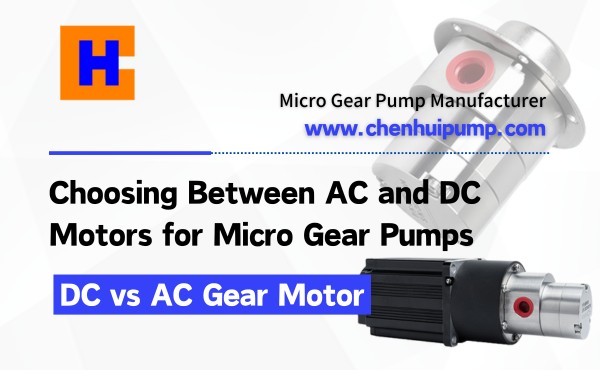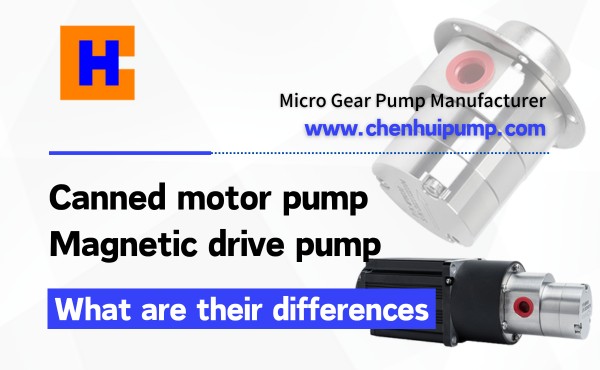The type of motor drives the efficiency and reliability of micro gear pumps. AC motor vs DC motor selection influences torque, speed control, and energy consumption. Understanding these differences ensures optimal performance for specific applications. Choosing the right motor enhances precision and reduces operational challenges.
AC Motor vs DC Motor: Key Differences
Design and Power Source
AC motors and DC motors differ significantly in design and power source. AC motors operate using alternating current, which flows in a sinusoidal pattern. This design allows them to connect directly to the power grid. In contrast, DC motors rely on direct current, which flows in a single direction.
They often use batteries or rectifiers as their power source. The internal structure also varies. AC motors typically have a simpler design with fewer components, while DC motors include brushes and a commutator, which facilitate current flow. These differences influence their application and maintenance needs.
Cost and Maintenance
The cost and maintenance of AC motors and DC motors vary due to their construction. AC motors are generally more affordable upfront because of their simpler design. They also require less maintenance since they lack brushes, which wear out over time.
On the other hand, DC motors tend to have higher initial costs. Their brushes and commutators demand regular inspection and replacement. However, DC motors offer advantages in specific applications that justify their maintenance requirements.
Efficiency and Performance
Efficiency and performance are critical factors when comparing AC motors and DC motors. AC motors excel in high-speed operations and energy efficiency, making them suitable for continuous use. Their design minimizes energy loss, ensuring consistent performance.
DC motors, however, provide superior performance in applications requiring precise speed control and high torque at low speeds. This makes them ideal for tasks demanding accuracy and adaptability.
Torque and Speed Control
Torque and speed control are areas where AC motors and DC motors diverge. AC motors typically maintain a constant speed, which is advantageous for applications requiring steady operation. However, they may struggle with torque control at lower speeds.
DC motors shine in this aspect. They deliver high torque even at low speeds and allow for precise speed adjustments. This flexibility makes DC motors a preferred choice for applications needing variable speed and torque.
Benefits of AC Motors for Micro Gear Pumps
Energy Efficiency and High-Speed Operation
AC motors are known for their ability to operate at high speeds while maintaining energy efficiency. These motors use alternating current, which allows them to achieve consistent performance with minimal energy loss. An energy-efficient motor like an AC gear motor is ideal for applications requiring continuous operation.
The high-speed capabilities of AC motors make them suitable for micro gear pumps that need to handle large volumes of fluid quickly. This combination of speed and efficiency ensures reliable operation in demanding environments.
Cost-Effectiveness for Large-Scale Applications
AC motors offer significant cost advantages for large-scale applications. Their simpler design reduces manufacturing costs, making them more affordable than other motor types. Additionally, the low maintenance requirements of AC motors further enhance their cost-effectiveness.
For industries relying on micro gear pumps, using an AC gear motor can lower operational expenses over time. These gear motor advantages make AC motors a practical choice for businesses aiming to optimize their budgets without compromising performance.
Durability and Low Maintenance
The durability of AC motors is one of their most notable features. These motors have fewer moving parts, which reduces wear and tear. Unlike DC motors, AC motors do not rely on brushes or commutators, eliminating the need for frequent replacements. This design ensures long-lasting operation with minimal maintenance.
A high-performance AC motor can withstand harsh conditions, making it a reliable option for micro gear pumps used in industrial settings. The combination of durability and low maintenance contributes to the overall efficiency of these motors.
Benefits of DC Motors for Micro Gear Pumps
High Torque at Low Speeds
DC motors excel in applications requiring high torque at low speeds. This capability makes them ideal for micro gear pumps that need to handle viscous fluids or operate under varying load conditions. Unlike AC motors, which often struggle to maintain torque at lower speeds, DC motors deliver consistent power.
This feature ensures reliable operation in tasks demanding precision and strength. For industries like medical devices or chemical processing, where controlled fluid movement is critical, the high torque of DC motors enhances overall performance.
Precision and Adjustable Speed Control
One of the standout features of DC motors is their ability to provide precise speed control. These motors allow operators to adjust speed easily, making them suitable for applications requiring variable flow rates. Micro gear pumps powered by DC motors can adapt to changing operational demands without compromising efficiency.
This level of control ensures accurate fluid delivery, which is essential in fields like pharmaceuticals or laboratory equipment. The adjustable speed capability also reduces energy consumption, contributing to cost savings over time.
Reliability in Battery-Powered Systems
DC motors are highly reliable in battery-powered systems. Their compatibility with direct current makes them the preferred choice for portable or remote applications. Micro gear pumps using DC motors can operate efficiently in environments where access to an AC power source is limited.
This reliability is particularly valuable in industries such as automotive or aerospace, where battery-powered devices play a crucial role. The robust design of DC motors ensures consistent performance, even in challenging conditions.
How to Choose the Right Motor for Your Micro Gear Pump
Evaluating Application Requirements
Selecting the right motor for micro gear pumps begins with understanding the specific application needs. Different tasks demand varying levels of torque, speed, and precision. For instance, applications requiring high torque at low speeds may benefit from dc motors, while those needing consistent high-speed operation might favor ac motors.
Additionally, the type of fluid being pumped, whether viscous or non-viscous, plays a crucial role in determining the motor’s suitability. Electric motors must align with the operational environment, including temperature, humidity, and power availability. Evaluating these factors ensures optimal performance and reliability.
Balancing Cost, Efficiency, and Performance
Cost, efficiency, and performance are critical factors in motor selection. Ac motors often provide a cost-effective solution for large-scale operations due to their simpler design and lower maintenance needs. On the other hand, dc motors, while more expensive upfront, offer superior speed control and torque, making them ideal for precision tasks.
Comparing the energy efficiency of electric motors is also essential. Ac motors excel in energy savings during continuous operation, while dc motors shine in applications requiring variable speed. Striking the right balance between these factors helps achieve long-term operational success.
Considering Maintenance and Longevity
Maintenance and longevity significantly impact the overall cost of ownership for electric motors. Ac motors, with their brushless design, require minimal upkeep and offer extended durability. This makes them suitable for environments where maintenance access is limited.
Dc motors, however, demand regular inspection and replacement of brushes and commutators. Despite this, their robust design ensures reliable operation in specific applications. Choosing a motor that aligns with the maintenance capabilities of the operation reduces downtime and enhances the lifespan of micro gear pumps.
Conclusion
AC and DC motors each offer unique advantages. AC motors excel in energy efficiency and durability, while DC motors provide precision and high torque. Choosing the right motor depends on application requirements. Evaluating factors like torque, efficiency, and budget ensures optimal performance. Aligning motor selection with specific needs leads to better outcomes.





















